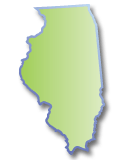Illinois Rebates and Incentives Summary

Illinois isn’t just in the middle of the country geographically. It’s smack dead center when it comes to solar energy. Solar Energy Industries ranks Illinois No. 25 in the nation for installed solar capacity. And the state is more or less on pace to hold its position. In 2014, Illinois installed 6 megawatts of solar capacity, which ranked it 27th for growth that year.
While maintaining a moderate position in the middle of the solar industry’s explosive growth, Illinois itself has seen substantial increases in its solar industry. More than 3,000 Illinois residents have jobs because of the state’s healthy solar industry, which saw a 165 percent increased financial investment year-over-year in 2014.
Much of the state’s solar industry growth can be credited to its forward-thinking policy. While the state hasn’t gone all out to build its solar status, it does have an aggressive renewable energy portfolio standard, requiring that the state’s utilities get 25 percent of their energy from renewable sources by 2025.
